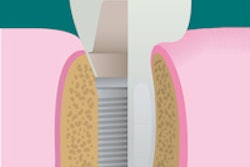Postmenopausal women need more than two dental checkups a year, according to a comparison study of women on and off bone-strengthening bisphosphonate therapies for osteoporosis conducted by researchers from the Case Western Reserve University School of Dental Medicine and the Cleveland Clinic (Menopause, February 2011, Vol. 18:2, pp. 164-170).
Leena Palomo, DDS, MSD, an assistant professor of periodontics from the dental school, and Maria Clarinda Buencamino-Francisco, MD, from the Center for Specialized Women's Health at the clinic, set out to study the long-term effects of bisphosphonate therapies on the mandible but came up with this new finding, which impacts all women after undergoing menopause.
The study included 28 postmenopausal women with normal bones who were compared with 28 women on bisphosphonate therapies for at least two years or more. The participants (all between the ages of 51 and 80) received cone-beam CT scans of their jaws and a complete periodontal check for dental plaque, bleeding, and loss of bone attachment and of the alveolar bone socket.
Both groups of women had followed the recommended ADA oral health standards to brush twice daily, floss, and have at least two dental checkups a year.
The findings for bone strength and other markers for osteoporosis were similar for both groups. But the researchers found both groups had increased dental plaque levels, which could endanger the mandible of normal postmenopausal women and reverse any benefits gained in bone mass.
While women from both groups had similar bone health results and women on the long-term oral bone-strengthening therapies showed no signs of bone death, they had abnormal dental plaque.
Menopausal women at risk for osteoporosis also are at risk for periodontal disease, Dr. Palomo noted in a press release. A prior study by Dr. Palomo showed that short-term use of bisphosphonates had increased bone density in the jaw. But over time, if hard plaque is left on teeth, it triggers the processes that lead to periodontal disease.
If that bone loss isn't stopped, Dr. Palomo said, a woman could potentially lose her teeth.
She added that the cytokines associated with periodontal disease also set in motion the process that weakens bones in osteoporosis.
As a result, postmenopausal women may need to see the dentist as many as four times a year to control dental plaque with deep periodontal cleanings, according to Dr. Palomo.
"Women also have to realize that bone disease and gum disease are two separate diseases," Dr. Palomo said. The bisphosphonate therapy isn't enough to keep jawbones strong and healthy, she added, which means getting rid of the dental plaque.



















